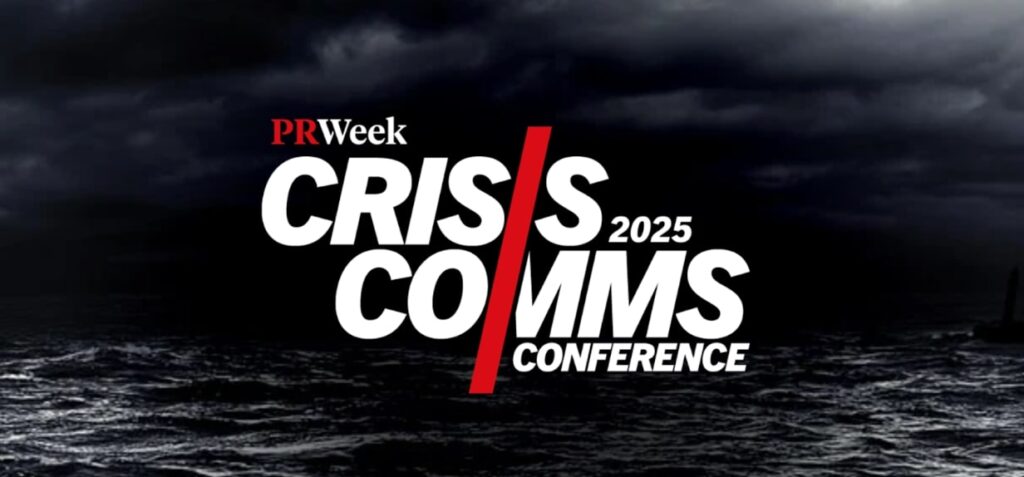Crisis Comms: Lessons in Narrative Risk from Blackbird.AI, PayPal, and Mars
When a narrative spins out of control, comms teams need more than speed; they need strategy. Here’s what top leaders revealed at PRWeek Crisis Comms, in Washington, D.C.

Greg Young, SVP of Commercial Strategy & Delivery at Blackbird.AI, spoke with Josh Criscoe of PayPal and Ed Hoover of Mars, Inc., as moderator Jess Ruderman of PRWeek led a direct and quietly urgent conversation. The topic was familiar—crisis communications—but the tone was not. This wasn’t a checklist of talking points or damage control best practices. It was a sobering discussion about how narrative attacks—coordinated, fast-moving, and often invisible—are rewriting the playbook for brand protection.
LEARN: What Is Narrative Intelligence?
Speed Alone Won’t Save You
Narratives that begin in fringe online spaces can move into the mainstream in hours. By the time most communications teams are alerted, the narrative has already evolved and taken on a life of its own. The panel emphasized that while real-time alerts are important, they are no longer sufficient. What’s needed is a response framework built for narrative velocity—how quickly and broadly a story spreads—not just the volume of mentions.
The Story Isn’t the Threat, The Structure Is
The panel urged attendees to look past the surface of individual headlines. Narrative threats gain traction not just because of what they say, but because of how they’re built, through emotional appeals, repeated exposure, and coordinated amplification. The message is just the tip of the spear. What brands are up against is the underlying structure that enables false or damaging narratives to persist and grow.
Cheap to Launch. Costly to Ignore.
A coordinated narrative attack can be mounted for as little as $50,000, yet the damage it causes can derail campaigns worth tens of millions. Threat actors don’t need reach; they need targeting. When brands lack visibility into how or where a narrative attack begins, they often find themselves in reactive mode, trying to contain fallout rather than proactively protecting their reputation.
If You Can’t See the Network, You Can’t Stop the Spread
Traditional monitoring tools focus on what is being said, but understanding who is saying it, why they are saying it, and how it spreads is just as critical. The panel highlighted the need for advanced tools to detect coordinated activity, trace narrative propagation across networks, and provide visibility into the actors driving the story over time.
Control the Recovery or Someone Else Will
Once a narrative gains momentum, letting it fade into the background isn’t always viable. Rebuilding trust requires deliberate action—engaging credible voices, amplifying counter-narratives rooted in truth, and taking public steps toward accountability. The most effective recovery strategies don’t merely defend the brand; they work to reshape the conversation altogether.
THE WAY FORWARD – Insights For Organization Leaders
You can’t fight a 2025 problem with a 2015 playbook. That was the core message echoed by all three panelists. Communications teams need to build capabilities that match the sophistication of modern threats. Here’s where to start:
Diagnose the Narrative, Not Just the Sentiment
Monitoring tone is no longer enough. Leaders must understand narrative structure—what’s being said, by whom, and why it resonates.
Build Cross-Functional Threat Teams
Crisis response can’t live in the comms silo. Align PR, security, and data teams to detect, interpret, and act on signals together.
Invest in Detection, Not Just Defense
Don’t wait for stories to go viral. Use tools that identify early indicators of coordinated activity and provide actionable insight upstream.
- To receive a complimentary copy of The Forrester External Threat Intelligence Landscape 2025 Report, visit here.
- To learn more about how Blackbird.AI can help you in these situations, book a demo.
Anthony Viera • Global Field Marketing Manager
Need help protecting your organization?
Book a demo today to learn more about Blackbird.AI.



